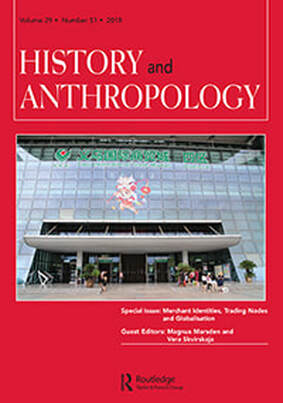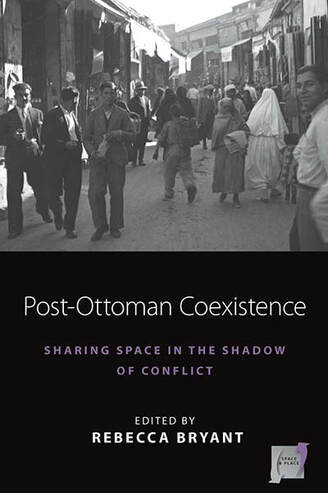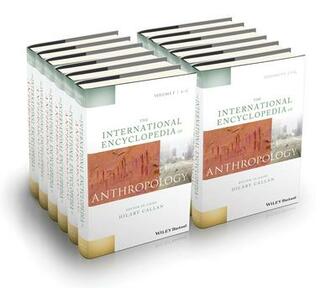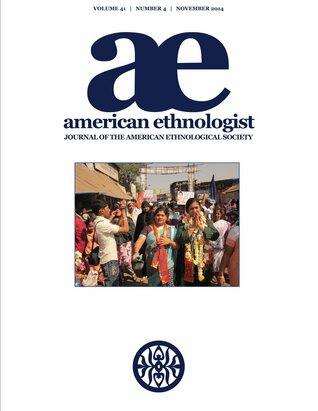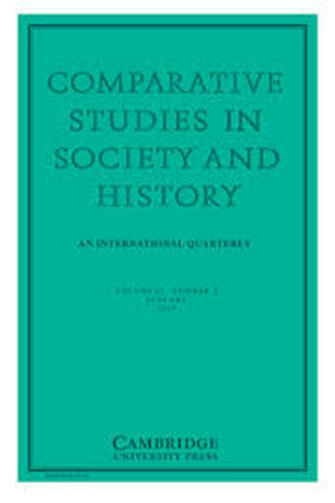NEW ARTICLE
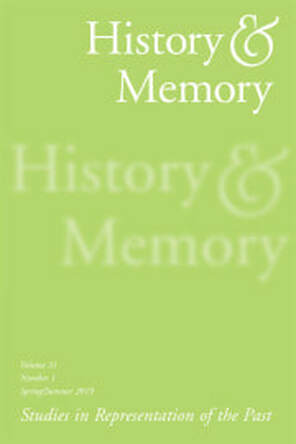
From Salvation to Struggle:
On Commemoration, Affect, and Agency in Cyprus
co-authored with Mete Hatay
This article explores the divisive commemoration of the battle of Erenköy, which has gained significance since the early 2000s in a resignifying of Turkish Cypriot history. Over time, the commemoration has shifted from a triumphalism symbolized in monuments to an act of mourning at the graves of the fallen. We show through this commemoration how actors have repurposed official narratives, deterritorializing them from the terrain of nationalist ideology and its countermemory and reterritorializing them in ways that look similar but are affectively quite different. We argue that this repurposing of the ritual produces an affect of agency among participants that is open-ended and future oriented.
On Commemoration, Affect, and Agency in Cyprus
co-authored with Mete Hatay
This article explores the divisive commemoration of the battle of Erenköy, which has gained significance since the early 2000s in a resignifying of Turkish Cypriot history. Over time, the commemoration has shifted from a triumphalism symbolized in monuments to an act of mourning at the graves of the fallen. We show through this commemoration how actors have repurposed official narratives, deterritorializing them from the terrain of nationalist ideology and its countermemory and reterritorializing them in ways that look similar but are affectively quite different. We argue that this repurposing of the ritual produces an affect of agency among participants that is open-ended and future oriented.
A deserted house near the Nicosia buffer zone. Photo by R. Bryant.
These are links to some recent journal articles and book chapters. A more comprehensive list of publications is at the bottom of the page.
|
Sovereignty
International Encyclopedia of Anthropology, ed. Hillary Callan In political philosophy and in general use, “sovereignty” refers to supreme political authority within a territory. This meaning is limited to state sovereignty, a usage that emerged with the modern state. Anthropology, however, has historically taken a wider view of sovereignty, in line with the discipline's more expansive understanding of the political. In line with constructivist political theory thatviews sovereignty as an everyday |
On Critical Times: Return, Repetition, and the Uncanny Present
This article posits that the vernacular understanding of crisis as existing in a different sort of time needs to be mined for what it tells us about social perceptions of temporality. Using three ethnographic examples from Cyprus, I ask here what temporal features we may identify that lead our interlocutors to see certain periods as “times of crisis”. In particular, I propose a notion that I call the uncanny present to refer to a particular sense of present-ness produced by futures that cannot be anticipated. Crisis, I claim, becomes such precisely because it brings the present into consciousness, creating an awareness or perception of present-ness that we do not normally have.
Introduction: Everyday Coexistence in the Post-Ottoman Space
In Southeast Europe, the Balkans, and Middle East, scholars often refer to the “peaceful coexistence” of various religious and ethnic groups under the Ottoman Empire before ethnonationalist conflicts dissolved that shared space and created legacies of division. This theoretical introduction to the volume provides an overview of meanings of coexistence in the context of lived histories of both peace and violence and offers an an understanding of coexistence through the frame of everyday diplomacy. Discussing what I call the "labor of peace" that regulates neighborly relations, I examine its relationship to the sovereignty of the house and to theories of hospitality. |
|
History's Remainders: On Time and Objects After Conflict in Cyprus
In the aftermath of war, those who remain must rebuild lives in spaces that bear the scars of conflict. This essay focuses on one such space, the unrecognized state in north Cyprus, which has experienced waves of displacement, ethnic cleansing, and the appropriation and redistribution of “enemy” property. Families raise children in plundered spaces; grandchildren play in gardens replanted after war; houses are furnished with the remains of others’ lives. In such contexts, the questions of what belongs to whom, and who belongs where, or with whom, are particularly contested, while the future of these places and objects remains uncertain. This essay asks what everyday historical work may be done with looted homes and objects, and it shows how practices with and stories about belongings may also be ways of helping us to “belong” in history. |
|
|
Partitions of Memory: Wounds and Witnessing in Cyprus
The image has become an iconic one: five young men in dirty uniforms kneel in the middle of a dusty plain with their hands behind their heads. They squint in the blinding midday sun, their faces expressing anxiety and a measure of fear. A Turkish soldier leans to talk to one of them, appearing calm, even friendly. To one side another Turkish soldier whose face we do not see stands guard. This photograph has become one of the most famous images to come out of the Cyprus conflict. The men's kneeling posture, the fright in their eyes, and the apparent calm of the soldiers all evoke a vulnerability to violence. And like the bloody photo of a woman and her children murdered in their Nicosia home that was used for decades by the Turkish Cypriot administration, or like certain photographs of distraught women crying for losses that we can only imagine, the image of these five young men has been reprinted in pamphlets and brochures, newspapers and books, in ways that take for granted its power to evoke their uncertain fate. |
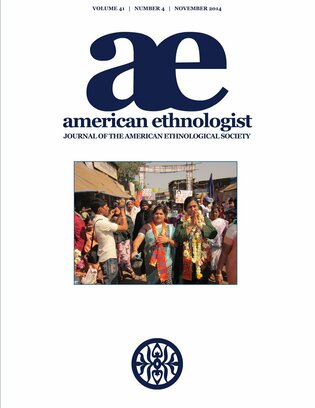
Guns and Guitars: Simulating Sovereignty in a State of Siege
(with Mete Hatay)
We present an ethnographic examination of the Agambenian approach to sovereignty through the example of a particular “state of exception,” namely, the militarized Turkish Cypriot enclaves of the 1963–74 period and their transformation into an unrecognized state structure. We argue that both the enclave administration and its subsequent variations have operated under a simulacrum of sovereignty, a claim to sovereignty that is both overproduced and incomplete. We examine the emergence of this simulacrum, which we claim allowed Turkish Cypriots to play with another form of existence, one at the interstices of exceptionality. This interstitial life, we argue, is characterized by a particular form of “abandonment,” one that may allow one to “enjoy one's exception.”
(with Mete Hatay)
We present an ethnographic examination of the Agambenian approach to sovereignty through the example of a particular “state of exception,” namely, the militarized Turkish Cypriot enclaves of the 1963–74 period and their transformation into an unrecognized state structure. We argue that both the enclave administration and its subsequent variations have operated under a simulacrum of sovereignty, a claim to sovereignty that is both overproduced and incomplete. We examine the emergence of this simulacrum, which we claim allowed Turkish Cypriots to play with another form of existence, one at the interstices of exceptionality. This interstitial life, we argue, is characterized by a particular form of “abandonment,” one that may allow one to “enjoy one's exception.”
Full list of journal articles and book chapters:
JOURNAL ARTICLES:
2019 (with Mete Hatay) “Myths of Salvation and Struggle: Contesting a Secular Pilgrimage in Cyprus,"
History & Memory31(1).
2019 (with Mete Hatay) “Performing Peace: Vernacular Reconciliation and the Diplomacy of Return in
Cyprus,” Journal of Refugee Studies(volume number to be assigned).
2016 “On Critical Times: Return, Repetition, and the Uncanny Present,” History and Anthropology27(1): 1-13.
2014 “History’s Remainders: Time and Objects after Conflict in Cyprus,” American Ethnologist 41(4): 681-697.
2014 “Living with Liminality: De Facto States on the Threshold of the Global,” Brown Journal of World Affairs,
20(2): Spring/Summer 2014.
2012 “Partitions of Memory: Institutions and Witnessing in Cyprus,” Comparative Studies in Society and History
54(2): 332-360.
2011 (with Mete Hatay) “Guns and Guitars: Simulating Sovereignty in a State of Siege,” American
Ethnologist 38(4): 631-649.
2010 “The State of Cypriot Silences,” Cyprus Review 22(2): 113-122.
2008 “Writing the Catastrophe: Nostalgia and Its Histories in Cyprus,” Journal of Modern Greek Studies 26(2),
399-422.
2008 (with Mete Hatay) “The Jasmine Scent of Nicosia: On Returns, Revolutions, and the Longing for
Forbidden Pasts,” Journal of Modern Greek Studies26(2), 423-449.
2006 “Betrayals of the Past,” Postcolonial Studies 9(3): 311-324.
2005 “The Soul Danced into the Body: Nation and Improvisation in Istanbul,” American Ethnologist32(2): 222-
238.
2003 “Bandits and ‘Bad Characters’: Law as Anthropological Practice in Cyprus, c. 1900,” Law and History
Review 21(2): 244-269.
2002 “The Purity of Spirit and the Power of Blood: A Comparative Perspective on Nation, Gender and
Kinship in Cyprus," The Journal of the Royal Anthropological Institute 8(3): 509-530.
2001 "Justice or Respect? A Comparative Perspective on Politics in Cyprus,” Ethnic and Racial Studies24(6):
892-924.
2001 “Pashas and Protests: On Revelation and Enlightenment in Cyprus,” special issue, “Epistemologies of
Islam,” ed. Faisal Devji, Cultural Dynamis 13(3): 317-338.
2001 “An Aesthetics of Self: Moral Remaking and Cypriot Education,” Comparative Studies in Society and
History 43(3), 583-614.
BOOK CHAPTERS:
2019 “Sovereignty in the Skies: An Anthropology of Everyday Aeropolitics,” in Sovereign Agency:
Anthropological Perspectives on State Desire, ed. R. Bryant and M. Reeves (Ithaca, NY: Cornell University
Press).
2019 (with Madeleine Reeves) “Introduction: Sovereign Agency and State Desire,” in Sovereign Agency.
2018 “Sovereignty,” in International Encyclopedia of Anthropology, ed. Hillary Callan (London: Wiley-
Blackwell).
2016 “Introduction: Everyday Coexistence in the Post-Ottoman Space,” in Everyday Coexistence, ed. R.
Bryant (Oxford: Berghahn Books).
2014 “Nostalgia and the Discovery of Loss: Essentializing the Turkish Cypriot Past,” in Anthropology and
Nostalgia, ed. D. Berliner and O. Ange (Oxford: Berghahn Books).
2012 “Introduction: Modalities of Time, History, and Memory in Ethnonational Conflicts,” co-authored with
Y. Papadakis, in Cyprus and the Politics of Memory: History, Community, and Conflict (ed. R. Bryant and Y.
Papadakis), London: I.B. Tauris.
2012 “The Fractures of a Struggle: Remembering and Forgetting Erenköy,” in Cyprus and the Politics of
Memory: History, Community, and Conflict.
2011 “Felaketi Yazmak: Kıbrıs’ta Nostalji ve Tarih(ler)i,” in Nasıl Hatırlıyoruz? Türkiye’de Bellek Çalışmaları, ed.
Leyla Neyzi, pp. 65-90. Istanbul: İşBankası Yayınları.
2011 “Landscapes of Loss: Territory, Property, and Belonging in Cyprus” [in Greek]. In Revisiting the Political:
Anthropological and Historical Research in Greek Society, ed. E. Papataxiarchis. Athens: Ellinika
Grammata.
2009 “Of Lemons and Laws: Property and the (Trans)national Order in Cyprus.” In Waging War and Making
Peace: Reparations and Human Rights, ed. Barbara Rose Johnston and Susan Slyomovics. San Francisco,
CA: Left Coast Press.
2006 “On the Condition of Postcoloniality in Cyprus.” In Divided Cyprus: Modernity and an Island in Conflict,
ed. Y. Papadakis and G. Welz. Bloomington, IN: Indiana University Press, pp. 47-65.
2006 “Signatures and ‘Simple Ones’: Creating a Public in Cyprus, c. 1900.” In Britain in Cyprus: Colonialism
and Post-Colonialism 1878-2006, ed. H. Faustmann and N. Peristianis. Mannheim/Moehnsee:
Bibliopolis, pp. 79-97.
2005 “Disciplining Ethnicity and Citizenship in Colonial Cyprus.” In Manufacturing Citizenship, ed. V. Benei.
London: Routledge, pp. 79-97.
1998 “An Education in Honor: Patriotism and the Greek Schools of Cyprus.” In Cyprus and Its People: Nation,
Identity, and Experience in an Unimaginable Community, 1955-1997, ed. Vangelis Calotychos. Boulder,
CO: Westview Press, pp. 53-68.
JOURNAL ARTICLES:
2019 (with Mete Hatay) “Myths of Salvation and Struggle: Contesting a Secular Pilgrimage in Cyprus,"
History & Memory31(1).
2019 (with Mete Hatay) “Performing Peace: Vernacular Reconciliation and the Diplomacy of Return in
Cyprus,” Journal of Refugee Studies(volume number to be assigned).
2016 “On Critical Times: Return, Repetition, and the Uncanny Present,” History and Anthropology27(1): 1-13.
2014 “History’s Remainders: Time and Objects after Conflict in Cyprus,” American Ethnologist 41(4): 681-697.
2014 “Living with Liminality: De Facto States on the Threshold of the Global,” Brown Journal of World Affairs,
20(2): Spring/Summer 2014.
2012 “Partitions of Memory: Institutions and Witnessing in Cyprus,” Comparative Studies in Society and History
54(2): 332-360.
2011 (with Mete Hatay) “Guns and Guitars: Simulating Sovereignty in a State of Siege,” American
Ethnologist 38(4): 631-649.
2010 “The State of Cypriot Silences,” Cyprus Review 22(2): 113-122.
2008 “Writing the Catastrophe: Nostalgia and Its Histories in Cyprus,” Journal of Modern Greek Studies 26(2),
399-422.
2008 (with Mete Hatay) “The Jasmine Scent of Nicosia: On Returns, Revolutions, and the Longing for
Forbidden Pasts,” Journal of Modern Greek Studies26(2), 423-449.
2006 “Betrayals of the Past,” Postcolonial Studies 9(3): 311-324.
2005 “The Soul Danced into the Body: Nation and Improvisation in Istanbul,” American Ethnologist32(2): 222-
238.
2003 “Bandits and ‘Bad Characters’: Law as Anthropological Practice in Cyprus, c. 1900,” Law and History
Review 21(2): 244-269.
2002 “The Purity of Spirit and the Power of Blood: A Comparative Perspective on Nation, Gender and
Kinship in Cyprus," The Journal of the Royal Anthropological Institute 8(3): 509-530.
2001 "Justice or Respect? A Comparative Perspective on Politics in Cyprus,” Ethnic and Racial Studies24(6):
892-924.
2001 “Pashas and Protests: On Revelation and Enlightenment in Cyprus,” special issue, “Epistemologies of
Islam,” ed. Faisal Devji, Cultural Dynamis 13(3): 317-338.
2001 “An Aesthetics of Self: Moral Remaking and Cypriot Education,” Comparative Studies in Society and
History 43(3), 583-614.
BOOK CHAPTERS:
2019 “Sovereignty in the Skies: An Anthropology of Everyday Aeropolitics,” in Sovereign Agency:
Anthropological Perspectives on State Desire, ed. R. Bryant and M. Reeves (Ithaca, NY: Cornell University
Press).
2019 (with Madeleine Reeves) “Introduction: Sovereign Agency and State Desire,” in Sovereign Agency.
2018 “Sovereignty,” in International Encyclopedia of Anthropology, ed. Hillary Callan (London: Wiley-
Blackwell).
2016 “Introduction: Everyday Coexistence in the Post-Ottoman Space,” in Everyday Coexistence, ed. R.
Bryant (Oxford: Berghahn Books).
2014 “Nostalgia and the Discovery of Loss: Essentializing the Turkish Cypriot Past,” in Anthropology and
Nostalgia, ed. D. Berliner and O. Ange (Oxford: Berghahn Books).
2012 “Introduction: Modalities of Time, History, and Memory in Ethnonational Conflicts,” co-authored with
Y. Papadakis, in Cyprus and the Politics of Memory: History, Community, and Conflict (ed. R. Bryant and Y.
Papadakis), London: I.B. Tauris.
2012 “The Fractures of a Struggle: Remembering and Forgetting Erenköy,” in Cyprus and the Politics of
Memory: History, Community, and Conflict.
2011 “Felaketi Yazmak: Kıbrıs’ta Nostalji ve Tarih(ler)i,” in Nasıl Hatırlıyoruz? Türkiye’de Bellek Çalışmaları, ed.
Leyla Neyzi, pp. 65-90. Istanbul: İşBankası Yayınları.
2011 “Landscapes of Loss: Territory, Property, and Belonging in Cyprus” [in Greek]. In Revisiting the Political:
Anthropological and Historical Research in Greek Society, ed. E. Papataxiarchis. Athens: Ellinika
Grammata.
2009 “Of Lemons and Laws: Property and the (Trans)national Order in Cyprus.” In Waging War and Making
Peace: Reparations and Human Rights, ed. Barbara Rose Johnston and Susan Slyomovics. San Francisco,
CA: Left Coast Press.
2006 “On the Condition of Postcoloniality in Cyprus.” In Divided Cyprus: Modernity and an Island in Conflict,
ed. Y. Papadakis and G. Welz. Bloomington, IN: Indiana University Press, pp. 47-65.
2006 “Signatures and ‘Simple Ones’: Creating a Public in Cyprus, c. 1900.” In Britain in Cyprus: Colonialism
and Post-Colonialism 1878-2006, ed. H. Faustmann and N. Peristianis. Mannheim/Moehnsee:
Bibliopolis, pp. 79-97.
2005 “Disciplining Ethnicity and Citizenship in Colonial Cyprus.” In Manufacturing Citizenship, ed. V. Benei.
London: Routledge, pp. 79-97.
1998 “An Education in Honor: Patriotism and the Greek Schools of Cyprus.” In Cyprus and Its People: Nation,
Identity, and Experience in an Unimaginable Community, 1955-1997, ed. Vangelis Calotychos. Boulder,
CO: Westview Press, pp. 53-68.
Proudly powered by Weebly
